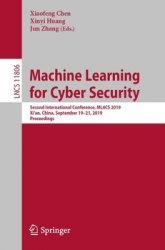 Название: Machine Learning for Cyber Security Название: Machine Learning for Cyber Security
Автор: Xiaofeng Chen, Xinyi Huang
Издательство: Springer
Год: 2019
Страниц: 410
Язык: английский
Формат: pdf (true)
Размер: 35.23 MB
This book constitutes the proceedings of the Second International Conference on Machine Learning for Cyber Security, ML4CS 2019, held in Xi’an, China in September 2019.
The 23 revised full papers and 3 short papers presented were carefully reviewed and selected from 70 submissions. The papers detail all aspects of machine learning in network infrastructure security, in network security detections and in application software security.
Cyber security has become the most crucially important topic for safeguarding national and personal safety. Achieving cyber security depends not only on defense technologies, but also the technologies to detect and discover cyber intrusions, threats and attacks. Herein, network data plays an essential role. However, network data for security detection (i.e., security-related data) normally features big data characters. How to collect and process them in an efficient, effective and precise way becomes a big challenge towards network security measurement. In this book, I will introduce the current research results of my research team in terms of adaptive network data collection in heterogenous networks, data fusion and compression for highly efficient network intrusion detection and economic data storage, a method of application-layer tunnel detection with rules and machine learning, as well as data mining and analytics on opinions posted in the website for retrieving trust information and generating reputation. Working on security-related network data collection, fusion, mining and analytics, we make efforts to collect and process as few as possible data in a context-aware manner, but achieve as accurate as possible security detection results.
There are challenges and issues when Machine Learning algorithm needs to access highly sensitive data for the training process. In order to address these issues, several privacy-preserving Deep Learning techniques, including Secure Multi-Party Computation and Homomorphic Encryption in Neural Network have been developed. There are also several methods to modify the Neural Network, so that it can be used in privacy-preserving environment. However, there is trade-off between privacy and performance among various techniques. In this paper, we discuss state-of-the-art of Privacy-Preserving Deep Learning, evaluate all methods, compare pros and cons of each approach, and address challenges and issues in the field of privacy-preserving by Deep Learning.
Contents:
Network Data Collection, Fusion, Mining and Analytics for Cyber Security
Malicious Web Request Detection Using Character-Level CNN
A LBP Texture Analysis Based Liveness Detection for Face Authentication
A Survey on Deep Learning Techniques for Privacy-Preserving
Quantifiable Network Security Measurement: A Study Based on an Index System
CatraDroid: A Call Trace Driven Detection of Malicious Behaiviors in Android Applications
Password Guessing via Neural Language Modeling
A Cooperative Placement Method for Machine Learning Workflows and Meteorological Big Data Security Protection in Cloud Computing
A Lightweight Certificateless User Authentication Scheme for Mobile Environment
Detection of GPS Spoofing Attack on Unmanned Aerial Vehicle System
SwipeVLock: A Supervised Unlocking Mechanism Based on Swipe Behavior on Smartphones
An Enumeration-Like Vector Sampling Method for Solving Approximate SVP
Secure Multiparty Learning from Aggregation of Locally Trained Models
Data-Driven Android Malware Intelligence: A Survey
Semantically Secure and Verifiable Multi-keyword Search in Cloud Computing
Content Recognition of Network Traffic Using Wavelet Transform and CNN
Compositional Information Flow Verification for Inter Application Communications in Android System
A Blackboard Sharing Mechanism for Community Cyber Threat Intelligence Based on Multi-Agent System
A Lightweight Secure IoT Surveillance Framework Based on DCT-DFRT Algorithms
Interpretable Encrypted Searchable Neural Networks
Game Theory Based Dynamic Defense Mechanism for SDN
A Visualization-Based Analysis on Classifying Android Malware
Protecting the Visual Fidelity of Machine Learning Datasets Using QR Codes
Reinforcement Learning Based UAV Trajectory and Power Control Against Jamming
A Fair and Efficient Secret Sharing Scheme Based on Cloud Assisting
Secure and Fast Decision Tree Evaluation on Outsourced Cloud Data
Who Activated My Voice Assistant? A Stealthy Attack on Android Phones Without Users’ Awareness
Скачать Machine Learning for Cyber Security
|